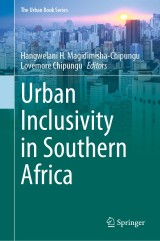Details

Urban Inclusivity in Southern Africa
The Urban Book Series
|
90,94 € |
|
| Verlag: | Springer |
| Format: | |
| Veröffentl.: | 28.09.2021 |
| ISBN/EAN: | 9783030815110 |
| Sprache: | englisch |
Dieses eBook enthält ein Wasserzeichen.
Beschreibungen
<p>This book’s point of departure rests on the premises that dimensions of the mainstream inclusive city discourse fail to capture in detail vulnerable clusters of society (being women, children, and the aging), the minority clusters (i.e., the blind, the disabled), and migrants. In addition, it fails to recognize the increase of spatial inequality driven by racial and class differences—a factor that has seen an increase in community violence and protests. The focus on spatial inequality has, for a long time, blind-folded urban authorities to ignore exclusion arising out of the same environments created with a notion of creating inclusivity. Hence this book “collapses spatial walls” as it seeks to uncover the true perspectives of inclusivity in cities beyond spatial dimensions but within social realms. The depth of this book’s enquiry rests on its critical investigation of Southern African cities’ through historical epochs of apartheid and colonialism in the region.<br></p>
<p>Part I: Laying the foundation for inclusive cities.- Laying the foundation for inclusive cities – An introduction.- Southern African cities at a glance.- The enduring relationship between civil engineering and spatial injustice.- Interrogating conceptual dimensions of inclusive cities.- Part II: Interrogating inclusivity of cities in selected countries.- Living beyond the dream of inclusivity. The race and class domain: Inclusivity in selected European cities.- Continuities and discontinuities in urban population policies in post-colonial Southern African cities: Towards a sustainable and inclusive framework.- Urbanisation, inclusive cities and the plight of the people with disability.- Excluding urban poor in the urban developments.- Diversifying inclusivity through the night economy: An observation from the terraces of durban and cape town.- Post-colonial cities in South Africa: A mirage of inclusivity.- Defining the layers of urban complexity: An epistemological shift towards inclusive cities.- Adaptive reuse strategies in Durban inner city using hybrid mapping tools.- Housing policy and the post-apartheid city: A tale of urban exclusion through housing delivery.- Reflecting on the inclusivity of culture in urban housing development – A case study of communal residential units in Durban.- Human settlements policies and women’s access to the city: Implications for inclusive cities.- The neglect of people with disabilities in integrated development planning in Ngangelizwe township, Mthatha.- Access and constraints to commuting for persons with disabilities in Gauteng province, South Africa.- Situating citizens’ participation in inclusive infrastructure development.- The language of struggle and radical activism as an inclusive city tool among the neglected urban poor of South Africa.- Closing remarks on inclusive cities.</p>
<p>This book’s point of departure rests on the premises that dimensions of the mainstream inclusive city discourse fail to capture in detail vulnerable clusters of society (being women, children, and the aging), the minority clusters (i.e., the blind, the disabled), and migrants. In addition, it fails to recognize the increase of spatial inequality driven by racial and class differences—a factor that has seen an increase in community violence and protests. The focus on spatial inequality has, for a long time, blind-folded urban authorities to ignore exclusion arising out of the same environments created with a notion of creating inclusivity. Hence this book “collapses spatial walls” as it seeks to uncover the true perspectives of inclusivity in cities beyond spatial dimensions but within social realms. The depth of this book’s enquiry rests on its critical investigation of Southern African cities’ through historical epochs of apartheid and colonialism in the region.<br></p>
Incorporates massive restructuring of urban spaces with the intention of ameliorating negativities arising out of the colonial and apartheid governments Presents timely topic as rising inequality and resulting incidents of crime and violence call for higher attention to inclusion in urban areas Shows that Southern Africa experiences remain undocumented, despite the claim that the urban policies are key to inclusive urban expansion
Diese Produkte könnten Sie auch interessieren:

Observing Systems for Atmospheric Composition

von: Guido Visconti, Pietro Di Carlo, W. Brune, M. Schoeberl, Andreas Wahner

149,79 €















